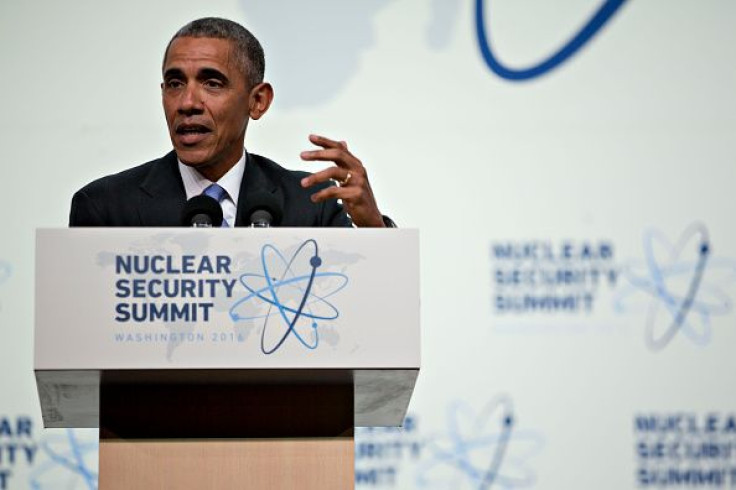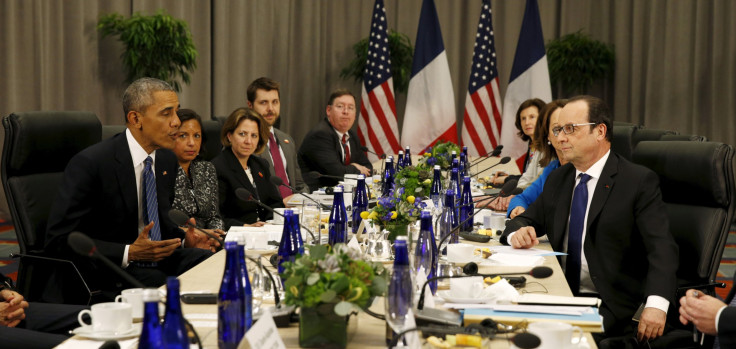Obama Nuclear Security Summit Live Stream: Watch US President Deliver End-Of-Meeting Press Conference

UPDATE: 6:38 p.m. EDT — President Barack Obama stressed the progress that has been made in reducing nuclear materials around the globe in closing remarks Friday at the Nuclear Security Summit in Washington, D.C. The president said enriched uranium and plutonium have been removed from 50 facilities in 30 countries, ensuring the material “will never fall into the hands of terrorists.”
When asked about statements made by Republican presidential candidate Donald Trump that Japan and South Korea should have nuclear weapons due to aggressive actions from North Korea, Obama said comments did come up on the sidelines of the summit.
“The person who made the statements doesn’t know much about foreign policy ... or the world generally,” Obama said, referring to Trump without using his name.
Watch @POTUS discuss the important progress we've made on #NuclearSecurity: https://t.co/QyBNjAvu7G https://t.co/fDU0niiIVo
— The White House (@WhiteHouse) April 1, 2016
Pres. Obama suggests Trump "doesn't know much about foreign policy or nuclear policy." https://t.co/y21HLhwl2X https://t.co/l54PRiXmHy
— ABC News (@ABC) April 1, 2016
Russian President Vladimir Putin was notably absent from the summit. Obama said more work must be done with the Kremlin, however nuclear arsenals in the U.S. and Russia are at their lowest levels in 60 years. The president noted that once Poland and Indonesia finish removing nuclear materials, Central Europe and Southeast Asia will be completely free of nuclear materials.
Original story:
U.S. President Barack Obama announced a series of new measures Friday to mitigate the threat of nuclear weapons and keep terrorists from acquiring them during the last day of the Nuclear Security Summit in Washington, D.C. The new nuclear safeguards included the first public inventory of the United States’ stock of highly enriched uranium, the elimination of all enriched uranium in Indonesia and the removal of large amounts of nuclear matter from Germany.
During the summit, the president hailed an amended 1980 treaty — known as the Convention on the Physical Protection of Nuclear Material — that has now been ratified by 102 nations, saying that would make it harder for terrorists to access warheads. The treaty was amended in 2005 to legally require that countries protect nuclear facilities and material, even for peaceful domestic use, storage and transport.
“Working together, our nations have made it harder for terrorists to get their hands on nuclear material,” Obama said Friday. The "key treaty" is expected to become effective soon.
Obama was expected to take questions from the press Friday night at 5:40 p.m. EDT at the conclusion of the summit. To watch a live stream of the news conference, click here.

He also noted that the international community needs to remain vigilant and that the threat of terrorists getting their hands on nukes remains real even with the amended treaty.
"There is no doubt that if these madmen ever got their hands on a nuclear bomb or nuclear material, they would certainly use it to kill as many people as possible," Obama said.
The president also cheered the Iranian nuclear agreement, saying that the accord — one of the highest-profile anti-nuclear proliferation deals since Obama’s nuclear summits began in 2010 — was working.
“After nearly two years of intensive negotiations, backed by strong sanctions, the countries represented in this room achieved what decades of animosity and rhetoric did not: a long-term deal that closes off every possible path to building a nuclear weapon and subjects Iran to the most comprehensive nuclear inspections ever negotiated,” Obama said during a meeting at the summit with members of the United Nations Security Council.
The 2016 Nuclear Security Summit is the last of four meetings between approximately 50 nations since 2010. The countries, in past summits in Washington, D.C., South Korea and the Netherlands, had reached consensus on deals to remove highly enriched uranium from 12 countries, shutdown or convert high enrichment facilities to low enrichment capacity and upgrade the security in 32 buildings that store nuclear materials, according to the Brookings Institute, a Washington-based think tank.
© Copyright IBTimes 2024. All rights reserved.












